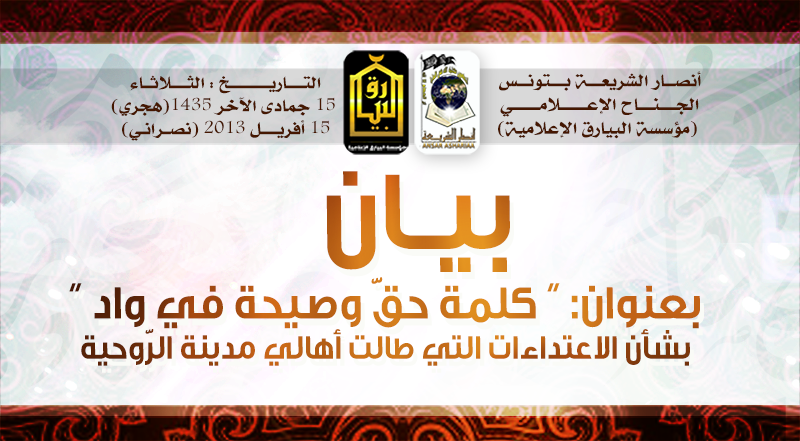
Click the following link for a safe PDF copy: Shaykh Abū al-Mundhir al-Shinqīṭī — “What Is Your Advice With Regard To the Annual Conference To Be Held By the Brothers in Anṣār al-Sharī’ah in Tunisia?”
___________
To inquire about a translation for this fatwā for a fee email: [email protected]
Category: Tunisia
Check out my new 'Policy Watch' for the Washington Institute: "Standoff Between the Tunisian Government and Ansar al-Sharia"
![]()
On May 10-11, Tunisian security services and police launched an unprecedented offensive against local Salafist group Ansar al-Sharia in Tunisia (AST), cracking down on members who were delivering public lectures or passing out their literature on the street. In response, AST leader Sheikh Abu Ayyad al-Tunisi made a veiled threat that youths would defend Islam in Tunisia just as they have in Afghanistan, Bosnia, Chechnya, Iraq, Somalia, and Syria — an indirect warning of potential full-blown jihad. Such a development would be a major break from Abu Ayyad’s public strategy over the past two years, in which he has argued that Tunisia is a land of dawa (i.e., proselytizing and associated Islamic outreach activities), not armed jihad. AST’s third annual conference in al-Qayrawan this weekend could help determine if the latest incident becomes a tipping point toward open conflict or an opportunity for both sides to back down.
Click here to read the rest.
Check out my new piece for Jamestown Foundation’s Militant Leadership Monitor: "Who’s Who in Tunisia’s Salafi-Jihadi Community: A Look at Key Leaders of Ansar al-Sharia in Tunisia"

Unfortunately, this article, which can be found here, is behind a pay wall. If one is interested in reading it, send me an email ([email protected]) and I’ll see what I can do.
al-Bayyāriq Foundation for Media presents a new statement from Anṣār al-Sharī’ah in Tunisia: "A Truthful Word and a Shout in the Valley: About the Attacks That Affected the People in the City of Rawḥīyyah in Silīyyānah Governorate"

Click the following link for a safe PDF copy: Anṣār al-Sharī’ah in Tunisia — “A Truthful Word and a Shout in the Valley- About the Attacks That Affected the People in the City of Rawḥīyyah in Silīyyānah Governorate”
___________
To inquire about a translation for this statement for a fee email: [email protected]
New article from Shamūkh al-Islām Forum: “Biographies of the Martyrs #3: Yusrī Fākhir al-Ṭarīqī (Abū Qadāmah al-Tūnisī)”
NOTE: Click the following links for previous parts in this series: #2 and #1
—

Click the following link for a safe PDF copy: Shamūkh al-Islām Forum — “Biographies of the Martyrs #3- Yusrī Fākhir al-Ṭarīqī (Abū Qadāmah al-Tūnisī)”
________
To inquire about a translation for this article for a fee email: [email protected]
Check out my new al-Wasat post co-authored with Daveed Gartenstein-Ross: "Did Tunisia’s Salafi Jihadists Just Announce Their Allegiance to al-Qaeda?"

On Friday, Magharebia came out with a report that has already garnered attention among those who follow jihadist militancy. The publication claims that Tunisia’s salafi jihadists have just announced their allegiance (bayat) to al-Qaeda:
Tunisian salafist jihadists announced their allegiance to al-Qaeda this week, accepting the group’s invitation to wage a holy war.
Al-Qaeda in the Islamic Maghreb’s call Sunday (March 17th) to fight Westerners, secularists, reformers and other so-called “enemies” was welcomed by Tunisian salafist jihadists, the movement’s leader Mohamed Anis Chaieb told Assabah.
This was the first time Tunisia’s salafist jihadist groups officially declared their allegiance to al-Qaeda. And the terror group’s call to arms could not have come at a more critical juncture for the still-fragile state.
This is an extraordinarily sloppily reported and misleading article that shouldn’t be taken at face value, although there is a relevant data point beneath the sensationalized presentation. The first, and most obvious, error is that Mohamed Anis Chaieb simply cannot be regarded as “the movement’s leader” in any way, shape, or form. The biggest salafi jihadist organization in Tunisia is Ansar al-Sharia Tunisia (AST), and Abu Iyad al-Tunisi is widelyrecognized as AST’s emir. Chaieb is an obscure enough figure that most analysts who follow Tunisia and the Maghreb closely have probably never heard of him. He is, in fact, affiliated with AST, as we will detail below. But it is not clear that the statement he made can be construed as speaking for AST as a whole.
Click here to read the rest.
al-Andalus Media presents a new statement from al-Qā’idah in the Islamic Maghrib: "Call to the Youth of Islam: To Those Who Aspire to Hijrah in the Way of God in the Islamic Maghrib in General and Tunisia in Particular"
UPDATE 3/23/13 4:07 PM: Here is an English translation of the below Arabic statement:

Click the following link for a safe PDF copy: al-Qā’idah in the Islamic Maghrib — “Call to the Youth of Islam- To Those Who Aspire to Hijrah in the Way of God in the Islamic Maghrib in General and Tunisia in Particular” (En)
____________
—

Click the following link for a safe PDF copy: al-Qā’idah in the Islamic Maghrib — “Call to the Youth of Islam- To Those Who Aspire to Hijrah in the Way of God in the Islamic Maghrib in General and Tunisia in Particular”
__________
New article from Shamūkh al-Islām Forum: “Biographies of the Martyrs #2: Abū al-Qa'qā' al-Tūnisī ('Abd Allah Ḥabīb al-Maṭwī)"
NOTE: Click here to the first part in this series.
—

Click the following link for a safe PDF copy: Shamūkh al-Islām Forum — “Biographies of the Martyrs #2- Abū al-Qa’qā’ al-Tūnisī (‘Abd Allah Ḥabīb al-Maṭwī)”
__________
To inquire about a translation for this article for a fee email: [email protected]
Check out my new article for Foreign Policy’s Middle East Channel: “Meeting Tunisia's Ansar al-Sharia”

I walk through a Tunisian market around midday, at the entrance to the fortress of Sousse, a town about 90 minutes southeast of the capital Tunis on the coast. A man is selling Salafi books and copies of the Quran from a maple wood table, 12 feet long, in front of a small masjid inside the old fortress walls, which were built in the ninth century by the Aghlabid caliph Ziyadat Allah I.
Two men are sitting nearby, at the edge of a dry, broken-down fountain, enjoying the sunny and mild weather. I approach them, along with three Tunisian friends, to ask for an interview. One dismisses me outright, gets up and leaves. He thinks I am in the American mukhabarat(intelligence). The other accepts. I sit next to him, shake his hand, and we both exchange salam alaykum pleasantries.
“Are You Muslim or a non-Muslim?” he asks.
This was the start of my conversation with Ramzi, a Salafi, who takes issue with the term since he sees himself as a Muslim. Based on the description of the activities he has been involved in, it is possible he is a member of Ansar al-Sharia in Sousse (AST), but he would not confirm. Ramzi has a traditional Salafi look, sporting a marine green thawb, black skullcap, and a fully-grown beard, but with a well-trimmed mustache. By his own account, he had spent six years in exile in Morocco before returning to Tunisia following the ouster of former President Zine el-Abidine Ben Ali.
“Bidun sura aw fidiyo” are his conditions for an interview — no pictures or video. A couple of weeks prior, Ramzi had talked with the France 2 series Envoyé Spécial, which did an exposé titled “La Tunisie sous la menace salafiste” (“Tunisia, under Salafist Threat). He told them his name was Nasim. Ramzi promises only five minutes, though the conversation lasts 15.
Ansar al-Sharia in Tunisia is an organization that believes in al Qaeda’s worldview, but primarily at this juncture only focuses on local recruitment and missionary activities. AST typically sets up lectures from prominent Tunisian Salafi clerics, passes out mainstream Salafi literature at weekly markets, provides food, medicine, and clothing in charitable convoys, and publishes about its activities on Facebook as well as highlights key news events and new releases relating to the global jihadi world.
Unlike al Qaeda and its like-minded groups around the greater Middle East and North Africa, on the whole, AST has been a non-violent organization — besides alleged involvement in the attack on the U.S. Embassy in Tunis in September 2012. Its main focus has been on dawa (missionary work). This is an under studied aspect of many current jihadi organizations. Much of this has come about as a consequence of the excesses of Abu Musab al-Zarqawi and al Qaeda in Iraq last decade.
Groups like AST largely follow the ideas of Sheikh Abu Muhammad al-Maqdisi who has attempted to steer the community toward a more “pure” jihad. Maqdisi emphasizes the importance of consolidating power through education and dawa rather than focusing on fighting to damage the enemy. The groups working to change the emphasis on their actions, fostering the possibility of gaining a constituency in the same manner that ideologically different Islamists like the Muslim Brotherhood, Hamas, and Hezbollah have been doing for years. That being said, because AST believes in al Qaeda’s ideology, it could be susceptible to engaging in violence in addition to dawa activities in the future if it sees it fit. It is difficult to predict if and when this might happen, but it should not be ruled out.
Click here to read the rest.
Check out my new article for Foreign Affairs: "Tunisia's Post-Revolution Blues"

At least Tunisia is not as bad as Egypt — that is the hardly comforting good news coming out of the country where the Arab Spring began, more than two years ago. The bad news is that Tunisia has come up far short of the lofty expectations set by Tunisians and outsiders in January 2011, when protests finally forced President Zine el-Abidine Ben Ali from office. Among the Middle East’s post-revolutionary governments, Tunisia still has the best chance of turning into a consolidated democracy, but barriers old and new are making the task far more difficult.
As I discovered during a recent research trip, Tunisians are deeply worried about their country’s sluggish economy, worsening security situation, and never-ending political stalemate. The protests that began the revolution centered on the lack of job opportunities, and Tunisians at all levels of society are still demanding economic improvement. Now, however, they are increasingly fearful for their own safety, the assassination of the popular left-leaning and secular politician Chokri Belaid being just the latest cause for concern, and they are growing disillusioned with the country’s acute political polarization. Together, the lack of progress on these fronts has left once hopeful observers worrying that if Tunisia, a small, educated, and religiously and ethnically homogenous country, is having so much trouble with its transition, then perhaps every other Arab Spring country is doomed, too.
Click here to read the rest.
